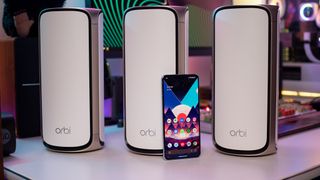Wi-Fi 7 is ready to go mainstream
The Wi-Fi Alliance is now starting to certify Wi-Fi 7 devices, including routers, phones, and notebooks.

There's already no shortage of Wi-Fi 7 routers, and if you're buying a flagship phone in 2024, there's a good chance that it comes with a Wi-Fi 7 modem as well. There's only one problem; the Wi-Fi 7 standard wasn't actually finalized — until now. The Wi-Fi Alliance is now starting to certify devices that use the latest generation of wireless connectivity, and the goal is to make sure these devices work with each other seamlessly.
Basically, the certification allows router brands and device manufacturers to guarantee that their products will work with other Wi-Fi 7 devices. Qualcomm, for its part, is announcing that it has several designs that leverage Wi-Fi 7, and that it achieved the Wi-Fi Alliance certification — dubbed Wi-Fi Certified 7 — for the FastConnect 7800 module that's baked into the Snapdragon 8 Gen 3 and 8 Gen 2, and the Networking Pro portfolio.
Wi-Fi Certified 7 is designed to enable interoperability, and ensure that devices from various brands work without any issues. In addition to Qualcomm, the likes of MediaTek, Intel, Broadcom, CommScope, and MaxLinear are also picking up certifications for their latest networking products.
I chatted with Andy Davidson, Sr. Director of Technology Planning at Qualcomm, ahead of the announcement to understand a little more about how Wi-Fi 7 is different. Wi-Fi 7 uses the 6GHz band — similar to Wi-Fi 6E — but introduces 320Mhz channels that have the potential to deliver significantly greater bandwidth. This proved to be the case when I reviewed the Netgear Orbi 970 — it was the fastest router I tested by far.

Wi-Fi 7 also uses a clever new feature called Multi-Link Operation (MLO) that lets devices connect to two bands at the same time, leading to better signal strength and bandwidth. There are a lot of other advantages as well — like increased transmission with 4K QAM — but the switch to 320MHz channels and MLO is where you'll see the biggest difference over earlier versions of the standard.
Davidson noted that Qualcomm's differentiation in this area comes from the ability to create a high-band simultaneous multi-link connection that essentially aggregates two bands — similar to how Link Aggregation works over Ethernet. The chip vendor has been working with other manufacturers over the last two years to test the Wi-Fi 7 standard, and all the learnings from these "test beds" are slated to go into consumer hardware that's launching over the course of 2024.
On that note, Qualcomm has over 450 products that leverage its Wi-Fi 7 modems, with 200 mobile devices, notebooks, and XR products slated to launch and another 250 access points and routers that use Qualcomm tech set to debut. While Wi-Fi 7 routers have been available for a few months now, the fact that the Wi-Fi Alliance is now starting to certify products means we'll get a deluge over the coming months.
Be an expert in 5 minutes
Get the latest news from Android Central, your trusted companion in the world of Android

Harish Jonnalagadda is a Senior Editor overseeing Asia at Android Central. He leads the site's coverage of Chinese phone brands, contributing to reviews, features, and buying guides. He also writes about storage servers, audio products, and the semiconductor industry. Contact him on Twitter at @chunkynerd.